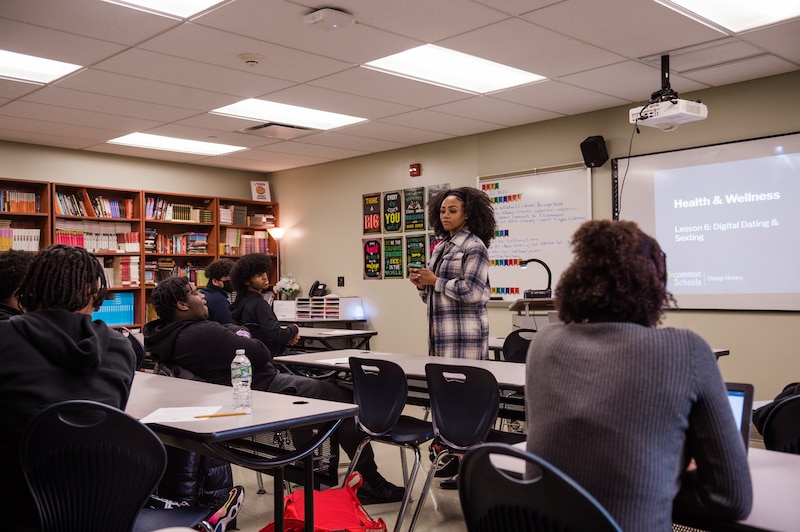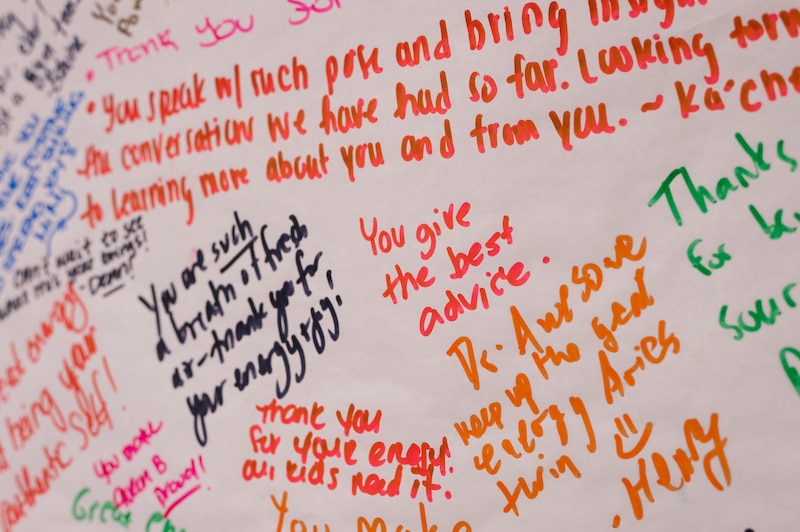I went to 19 funerals during the first year of COVID. When I wasn’t saying goodbye to people I cared about, I was in front of a screen that was my connection to school and friends for a year and a half.
I was used to greeting my friends and teachers with an enthusiastic “Hiiiii” and taking part in lively class discussions — experiences I couldn’t replicate on a computer. During online school, I struggled with grief and depression, and a general sense of being overwhelmed. I was trying to learn while dealing with spotty internet and helping my three younger god-siblings with their studies. During this time, I turned to a longtime hobby: journaling. It helped me get in touch with myself and work through what was being thrown at me.
As I was jotting down some ideas in my notebook one morning, a question came to mind: When will we ever talk about mental health here? At the height of COVID, with so many of us suffering in isolation, it was definitely needed.
I was already in the process of starting a wellness council, a club where students could share their struggles and hear about what others are going through. If we could start this club, why not a class about mental health built into the school day?
My research began online. I read studies about the benefits of social and emotional learning and thought about its real-world application. I watched lectures on YouTube about the importance of lessons on mental health. I even spoke with curriculum developers. Personal struggles, together with this research, underscored the need for a mental health class at my Newark high school.

So I scheduled a meeting with my principal, Mr. Michael Mann, and began to work on a presentation that included testimonials from current and former students and staff. I had sent out surveys to students — freshmen through seniors — asking them about their mental health needs. They said a class that focused on student mental health would not only reduce the stigma surrounding mental health, but would also help foster social and leadership skills, self-awareness, and caring connections with those around them.
My principal seemed surprised at how passionately I advocated for this class, and he offered his wholehearted support. Next, I reached out to Ms. Julie Jackson, one of the co-CEOs of Uncommon Schools. (My school, North Star Academy Washington Park High School in Newark, is part of the Uncommon Schools charter network.) Soon, I was sitting down with one of the most powerful people in my school’s network. Ms. Jackson started the meeting by praising my efforts, and she assured me that it would be a casual conversation. Turns out, she was onboard, too.
Next, I created a working group made up of educators and North Star students. Our goal: To start a class where students could learn about the causes and symptoms of mental health challenges, and how to advocate for themselves and their peers.
Students tell me how this outlet helps them find their inner voice and relieve stress, making them less likely to experience burnout.
The summer between my freshman and sophomore years, I worked on lesson plans and brainstormed ideas for final projects. A lesson I’m especially proud of is about consent. Here’s one of the assignments: “Over the next week, please log two situations in which you were asked to give permission to someone else for something and at least three situations in which you asked someone else for permission to do something.” This lesson centers on the three R’s of consent: Rights, Respect, and Responsibility. Another lesson asks students about the evolution of their ideas about mental health, and a third helps students understand the difference between sex and gender.
The result of all this planning is a real-life class called Health and Wellness.

Because the class was piloted during COVID’s peak, it started off virtual so attendance and class participation initially lagged. However, since last school year, the class has been in person. Dr. Shaniqua Fitzgerald, who now teaches Health and Wellness, welcomes students into her cozy corner classroom with a wide smile. The smell of cocoa butter fills the entire room. It’s warm and serene inside. Just walking by on my way to class, I often hear students excitedly screaming out different answers whenever Dr. Fitzgerald poses a question.
Students tell me how this outlet helps them find their inner voice and relieve stress, making them less likely to experience burnout. They say they have a better sense of autonomy and agency thanks to lessons on sexual health. (Now, Dr. Fitzgerald and I are talking about bringing this class to other schools in the charter network.)
During remote learning, struggling with grief and depression, I wanted to develop something that would help me feel better and empower others. I’m proud of what Health and Wellness has become, a class that destigmatizes difficult conversations, and fosters knowledge, openness, empathy, and care.
Dashawn Sheffield is a senior at North Star Academy Washington Park High School. He aims to educate students and faculty on the symptoms of mental health issues, and promote school-based mental health support.


